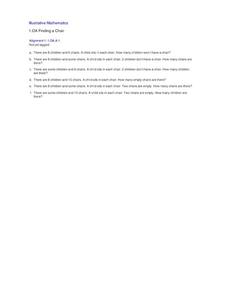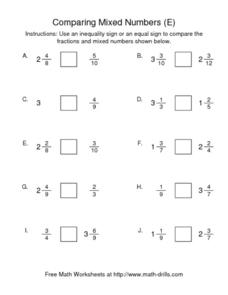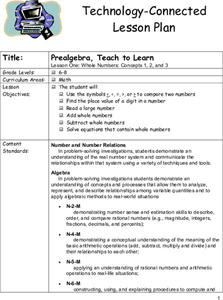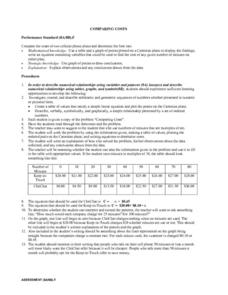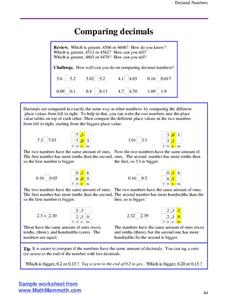Curated OER
Study Buddies: Dividing by One-Digit Divisors
Fourth and fifth graders learn long division by one digit divisors. They learn the steps: divide, multiply, subtract, compare, bring down, repeat. Pupils solve five problems in a step by step format.
Curated OER
Greater Than, Less Than 20
Learners compare number sets. They study each number pair then compare them using the greater than, less than, or equals symbols. There are 10 problems to solve.
Illustrative Mathematics
Finding a Chair
Here is an activity that incorporates subtraction in word problems. Youngsters are provided with six word problems that essentially deal with the same numbers in each problem, yet use different comparison language. These problems are...
Curated OER
Amanda Bean's Amazing Dream
Use the book Amanda Bean's Amazing Dream to inspire your learners to solve and create multiplication word problems. After listening to the story, they solve two "which is more" problems. They explain their thinking with images, words, or...
Curated OER
Comparing Mixed Numbers (E)
In this comparing numbers worksheet, 5th graders use an inequality sign or an equal sign to compare the fractions and mixed numbers. Students solve 10 fraction comparisons.
Curated OER
Comparisons
Explore number value with learners through playing cards. They examine sets of three cards, adding up the value and comparing it to another set of three. Learners write in which is greater than or is less than to show number value...
Louisiana Department of Education
Hatchet
Accompany a novel study of Hatchet by Gary Paulson with a unit consisting of 16 lessons focused on physical and emotional survival. Reading the story along with a variety of informational texts, scholars compare and contrast reading...
Scholastic
Pilgrim and Wampanoag Daily Life for Grades 6–8
Two slide shows, viewed side-by-side, permit middle schoolers to compare and contrast the lives of the Pilgrims of the Plimoth colony and the Wampanoags. Four videos take learners on virtual field trips to the Plymouth plantation. And an...
EngageNY
Grade 5 Math Module 1, Topic F, Lesson 15
Remainders don't need to remain a mystery. The 16th of 18 parts in Grade 5 Math Module 1 continues the study of dividing decimals by a whole number. Scholars see how to rename the remainder to a smaller unit, such as when dividing 1.7 or...
Los Angeles County Office of Education
Assessment for the California Mathematics Standards Grade 2
Test scholars mathematic skills with an assessment addressing addition, subtraction, multiplication, place value, measurement, geometric shapes, expanded notation; and their ability to compare numbers, write number sentences, draw...
EngageNY
Grade 5 Math Module 1, Topic E, Lesson 12
Continuing from the previous instructional activity, scholars work on mastering the skill of multiplying decimal fractions by a whole number. The method employed in the instructional activity is to convert the decimal fraction to its...
EngageNY
Grade 5 Math Module 1, Topic F, Lesson 14
Be sure to place value on place value understanding. Young mathematicians learn to divide decimals by whole numbers when compatible numbers are not available. They use place value discs in place value charts, then connect this strategy...
Curated OER
Positive and Negative Numbers
For this positive and negative numbers worksheet, 4th graders compare 3 and -4, put 5 numbers in order from least to greatest, locate 5 numbers on a number line, fill in 6 missing numbers in a set of numbers and answer 1 word problem.
Curated OER
Fractions XI Adding Mixed Numbers with Unlike Denominators
This PowerPoint demonstrates how to add mixed numbers with unlike denominators. The slides display examples of problems, along with steps that students can easily follow.
Curated OER
Whole Numbers
Student are assigned one of the sections on whole numbers. After reviewing the content, they teach their assigned sections to other class mates. They publish their findings on a PowerPoint slide show to use when they teach their section.
Math Mammoth
Multiply By Whole Tens And Hundreds 1
In this multiply by whole tens and hundreds worksheet, students problem solve and calculate fifty seven equations either by writing the additions as multiplications, solving and comparing and/or filling in the missing factors.
Curated OER
Prime Factorization
In this prime factorization worksheet, students solve 7 multiple choice problems. Students find the prime factorization of 91, 84, 78, 70, 67,63, and 36.
Curated OER
Comparing Costs
Students compare the costs of two cellular phone plans and determine the best rate. They use a table and a graph of points plotted on a Cartesian plane to display their findings. Students write an equation containing variables that could...
Curated OER
Compare and Contrast Countries
Seventh graders explore the wealth of other countries. In this gross domestic product instructional activity, 7th graders calculate the numbers for various countries. Students then compare and contrast the differences between Africa,...
Curated OER
Comparing Decimals
In this comparing decimals instructional activity, students compare numbers with decimals up to the hundredths place. Students complete 13 problems.
Curated OER
Comparing and Ordering Numbers
In this comparing and ordering numbers worksheet, students, working with a partner, problem solve and calculate the answers to five word problems or equations involving numbers.
Curated OER
Comparing Decimals (A)
In this inequalities practice learning exercise, learners use their math skills to compare 30 pairs of decimal numbers. Students fill in the 30 blanks with greater than, less than, or equal to symbols.
Curated OER
Compare Weight
For this measurement worksheet, 3rd graders number objects in order from heaviest to lightest using the numbers 1, 2, and 3. They compare pictures of items such as a bike, an elephant, and a piece of paper.
Curated OER
Arranging Numbers from 1 to 5
Kindergarteners arrange manipulatives or everyday objects in groups of one through five. They identify groups seen in pictures of nature and compare same numbers of different objects.




